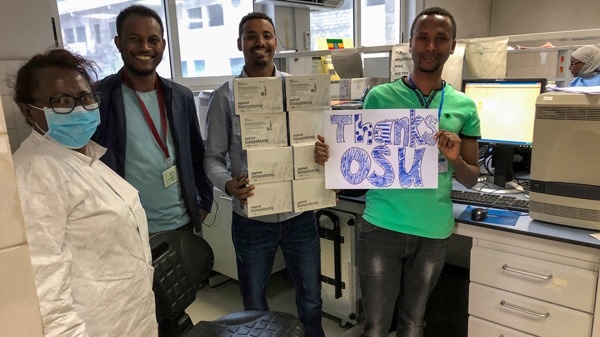
(The Ohio State University) – On January 30, the COVID-19 outbreak was declared a public health emergency. On March 11, it was characterized as a global pandemic, and on March 13, Ethiopia had its first confirmed case. Over the next few weeks, Ohio State University’s Global One Health initiative (GOHi) led an effort to quickly mobilize thousands of essential laboratory supplies to support the COVID-19 response efforts in Ethiopia.
As the number of cases continue to rise in Ethiopia, more testing facilities are becoming available to screen for COVID-19. However, as with most parts of the world, the country does not have enough testing supplies to meet the demand.
GOHi’s long-time partner and the country’s primary National Reference Laboratory for COVID-19 testing, the Ethiopian Public Health Institute (EPHI), was one of the available testing facilities in need of supplies.
- See also: Ethiopia steps up health spending with help from IMF emergency assistance ― IMF Country Focus
With support from Ethiopian Airlines, GOHi was able to send personal protective equipment, sample preparation kits, COVID-19 diagnostic reagents, PCR reaction plates, molecular laboratory plastic supplies and specimen collection materials to Ethiopia.
“These supplies will help EPHI conduct several thousands of COVID-19 tests in Ethiopia, where the capacity has been significantly low—only 36,000 tests [May 11, 2020], in a population of 110 million, have been performed in total since the beginning of the outbreak,” said Zelalem Mekuria, associate director of Infectious Disease Molecular Epidemiology Laboratory (IDMEL). “GOHi’s contribution has had substantial impact.”
A portion of the supplies were donated by three laboratories in the College of Veterinary Medicine, and the rest were procured through GOHi’s Global Health Security project, which is supported by the Centers for Disease Control and Prevention (CDC).
About Global One Health initiative
The Global One Health initiative connects the Ohio State University (OSU) to Ethiopia, Kenya, Tanzania, Mexico, Brazil, Thailand, China, India and beyond in a coordinated, multidisciplinary approach to improve health, build capacity, and provide learning opportunities for students across the globe. Initiated in 2009, the program expanded in 2012 to include OSU’s seven health sciences colleges as well as the colleges of agriculture, arts and sciences, business, education and human ecology, engineering and social work. Today hundreds of OSU students, faculty and staff are involved in the initiative, building capacity within cross-cutting issues including zoonotic diseases (such as Rabies, Anthrax and Brucellosis), antimicrobial resistance, cancer, maternal and child health, medicinal plants, food safety and curriculum twinning, and sharing information through innovative e-learning technology. The Global One Health initiative is the university’s largest, interdisciplinary example of institutional teamwork operating on a global scale.
